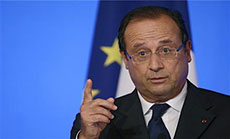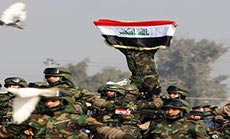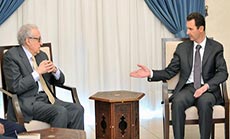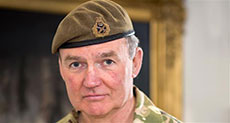Mursi Declares Emergency, Around 50 Dead in Weekend Clashes

Local Editor
Egyptian President Mohammad Mursi declared a month-long state of emergency Sunday in three cities along the Suez Canal that have been the focus of anti-government violence that has killed dozens of people over the past four days.
Seven people were shot dead and hundreds were injured in Port Said Sunday during the funerals of 33 protesters killed at the weekend. A total of 49 people have been killed in demonstrations around the country since Thursday and Mursi's opponents have called for more protests Monday.
"Down, down Mursi, down down the regime that killed and tortured us," people in Port Said chanted as the coffins of those killed Saturday were carried through the streets.
In a televised address, Mursi said a nightly curfew would be introduced in Port Said, Ismailia and Suez, starting Monday evening.
About 200 people protested in Ismailia after the announcement.
"The protection of the nation is the responsibility of everyone. We will confront any threat to its security with force and firmness within the remit of the law," the president said, adding that he offered condolences to families of the victims of those who died.
Following the address, Mursi's office said in a statement it was inviting political supporters and opponents for a national dialogue session Monday at 6 p.m. at the presidential palace.
The statement said it was inviting a range of Islamist allies and liberal and other opposition groups, as well as leading politicians such as leftist firebrand Hamdeen Sabahy and former foreign minister and Arab League chief Amr Moussa.
The spokesman for Egypt's main opposition coalition, the National Salvation Front, welcomed Mursi's steps to restore security.
"Of course we feel the president is missing the real problem on the ground which is his own polices," Khaled Dawoud told Reuters. But he added: "His call to implement emergency law was a right move given what is going on, namely thuggery and criminal actions."
In Cairo, the newly appointed Interior Minister Mohammad Ibrahim was ejected from the funeral of one of the police officers who died during Saturday's clashes in Port Said, according to witnesses and police sources.
State television said seven people died from gunshot wounds Sunday. Port Said's head of hospitals, Abdel Rahman Farag, told Reuters that more than 400 people had suffered from tear gas inhalation, while 38 were wounded by gunshots.
Gunshots killed many of the 33 who died Saturday when residents went on the rampage after a court sentenced 21 people, mostly from the Mediterranean port city, to death for their role in deadly football violence at a stadium there last year.
In Ismaila city, which lies on the Suez Canal between the cities of Suez and Port Said, police also fired tear gas at protesters attacking a police station with petrol bombs and stones, according to witnesses and a security source there.
The army, Egypt's interim ruler before Mursi's election, was sent back onto the streets to restore order in Port Said and Suez, which both lie on the Suez canal. In Suez, at least eight people were killed in clashes with police.
In Cairo, police fired tear gas at dozens at protesters throwing stones and Malatov cocktails in a fourth day of clashes over what demonstrators there and in other cities say is a power grab by Islamists two years after Hosni Mubarak was overthrown.
The protesters accuse Mursi, elected in June with the support of his Muslim Brotherhood group, of betraying the democratic goals of the revolution. Most of the deaths since Thursday were in Port Said and Suez, both cities where the army has now been deployed.
On a bridge close to Tahrir Square, youths hurled stones Sunday at police in riot gear who fired tear gas to push them back toward the square, the cauldron of the uprising that erupted on Jan. 25, 2011, and toppled Mubarak 18 days later.
Clashes also erupted in other streets near the square.
The opposition Popular Current and other groups have called for more protests Monday to mark what was one of the bloodiest days of the 2011 uprising.
Source: News Agencies, Edited by moqawama.org
Comments

France’s Hollande in Qatar for Warplane Deal
9 years ago
Iraq Police Dismantles Al-Qaeda Protest Site
10 years ago

